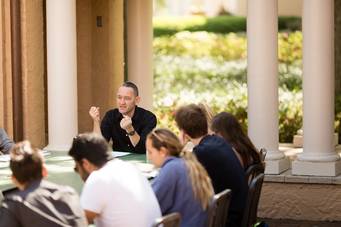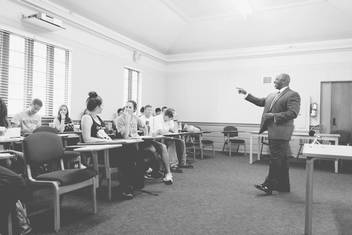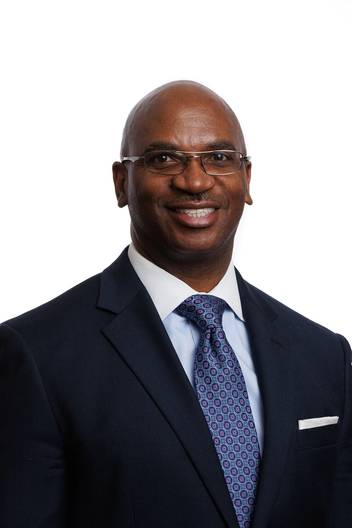
Ethics
How do societies and individuals determine what is right or wrong? What makes a principle fair or just? What makes moral claims true or accurate? The ethics minor at Rollins pursues questions that lie at the heart of responsible leadership and global citizenship, developing a critical framework that applies to every discipline.
At Rollins, you’ll form an ethical lens through which to tackle some of the toughest questions of the 21st century. Professors who specialize in sociopolitical issues provide personalized attention in small classes, extending what you learn to current events. You’ll not only explore how people make decisions around their values, but how background issues of historical inequity and access play a part as well. In the process you’ll dig deep, investigating how your own values have formed and helping to shape character and a meaningful career.
The ethics minor enhances any major and provides a competitive advantage in the job market. Whether in business, law, the sciences, social sciences, or the arts, employers increasingly demand candidates who demonstrate ethical decision-making.
Why Study Ethics at Rollins
Engaged Citizenship
You’ll learn to analyze the assumptions underlying your own ethical decision-making and apply critical thinking skills to complex values issues. Is a decision made on the basis of principles or consequences? Does it uphold individual rights or is it good for the majority? You’ll learn to peel apart the nuanced layers of what’s at stake ethically in any situation.
Real World Relevance
You’ll have a multitude of opportunities to put ethics into practice, whether tackling headlines in rigorous class discussions or engaging in service learning. Studying ethics also equips you to engage in Immersion and study abroad experiences more intentionally and integrate ethical reflection with experiential learning.
Competitive Advantage
In a diverse workforce, employers increasingly seek out professionals who are equipped to navigate questions around values. Having a nuanced understanding of how to handle situations when values conflict has resounding positive ramifications in the workplace.

See for Yourself
Get a feel for Rollins’ unique brand of engaged learning and personalized attention through one of our virtual or in-person visit experiences.
Popular Courses
Our interdisciplinary ethics curriculum offers a lens of thinking about the world through structured ethical frameworks, which enhances majors in everything from economics and business to philosophy and computer science.
PHI 242 Zombies, Serial Killers, and Madmen
Can we hold irrational people responsible for their actions? What should we do with those who commit horrible crimes? Inspired by pop culture, you’ll investigate eerie phenomena to answer questions like these.

PHI 315 Gender, Rights, and Relativism
Should certain countries, religions, or nationalities have a role in shaping practices around women’s rights? You’ll explore tensions between respecting cultural traditions—which disproportionately affect women—and respecting human rights.

RCC 100-27 Portlando: Green Cities
Examine how ethical values are at play in the pursuit of urban sustainability efforts, such as solar panels and mass transit. The cities of Portland, Oregon, and Orlando, Florida, serve as bookends for discussion.

Expert Faculty
Rollins professors are uniquely qualified to teach ethics and represent a dozen disciplines, with the core faculty for this minor holding PhDs in Western ethics and value theory. This group has expertise on ethical theories, practices, and case studies within their own fields, including anthropology, business, medicine and health, the sciences, and the arts. Additionally, more than 40 Rollins faculty have training in how to teach and apply ethical reasoning in their disciplines.
Department of Philosophy & Religion
Telephone: 407.646.2139

Margaret McLaren, PhD
Professor of Philosophy
Research interests: Human rights and globalization, feminist theory and gender issues, and 20th-century French philosophy

L. Ryan Musgrave, PhD
Associate Professor of Philosophy; Program Coordinator, Sexuality, Women’s, and Gender Studies
Research Interests: Ethics/value theory, sociopolitical philosophy, aesthetics/philosophy of art, philosophy of education, and philosophy of law

Eric Smaw, PhD
Associate Professor of Philosophy; Co-Director, Pre-Law Advising
Research interests: Philosophy of law, political philosophy, ethics, and human rights

Josephine Balzac-Arroyo, JD, LLM
Assistant Professor of Social Entrepreneurship
Research interests: Corporate social responsibility, climate justice sustainable development, international trade, human rights, and environmental justice

Susan Libby, PhD
Professor of Art History
Research interests: European art, with an emphasis on colonialism and construction of race and gender; contemporary cultural property disputes

Lucy Littler, PhD
Senior Lecturer
Research interests: American exceptionalism and the meanings of race in contemporary American culture

Julia Maskivker, PhD
Associate Professor of Political Science
Research interests: Contemporary theories of justice, global ethics, and social and economic citizenship

Rachel Newcomb, PhD
Professor of Anthropology
Research interests: Cultural and applied/public anthropology, Middle East and North Africa, gender, Islam, globalization, immigration, and food studies
